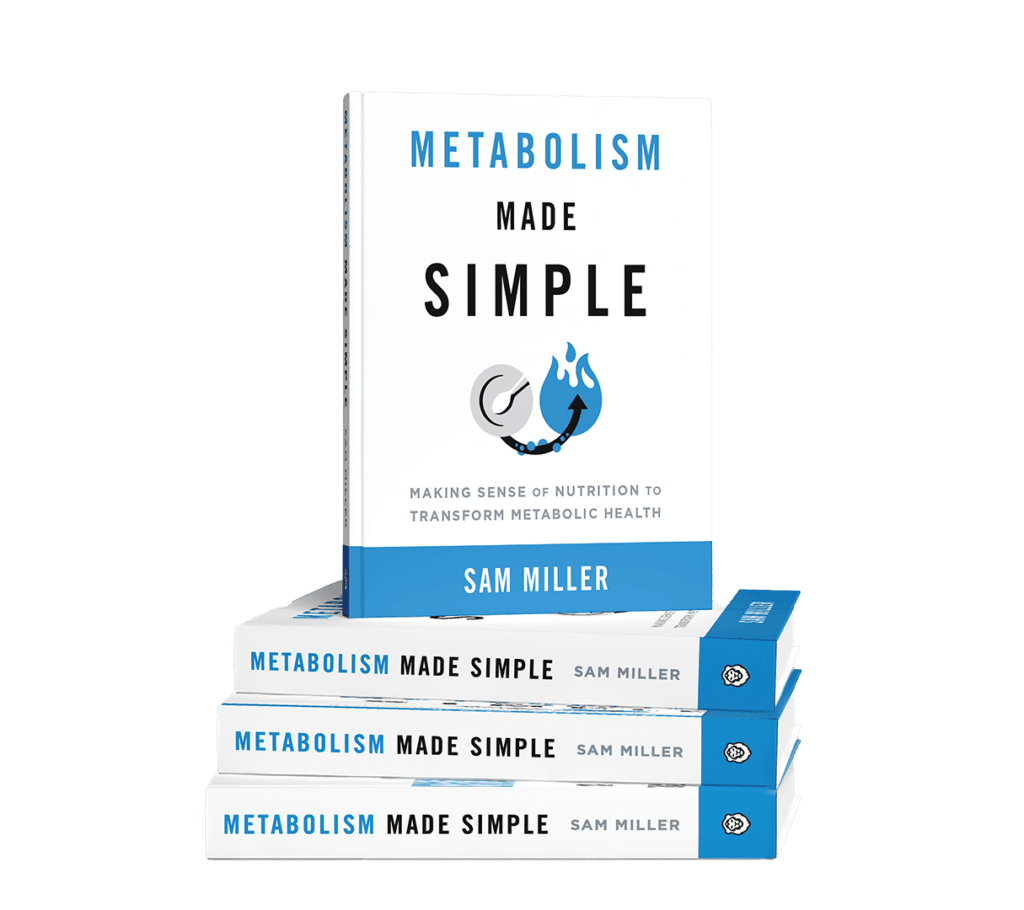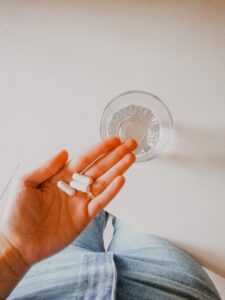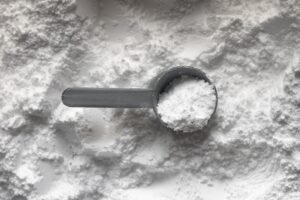In this post, we will explore 8 evidence-based reasons to take supplements. The topic of dietary supplements can be pretty polarizing. If you just take 5 minutes to look across social media supplement information, you’ll find a huge array of advice.
On one end of the spectrum, you’ll hear that supplements are completely useless and they only result in expensive urine, and on the other end of the spectrum, you’ll see people recommending you take 800 dollars a month’s worth to improve your overall health since supplements are the only way to get essential nutrients.
According to science, the truth about taking dietary supplements is somewhere in between, and taking supplements can help people maintain health. However, there’s also a lot more nuance involved, including the type and form of the supplement, the quality and reputation of the brand, and, most importantly, the specific client context and their need.
Here’s why I recommend supplements, we’ll go through each one by one:
- Dietary, hereditary, or lifestyle deficiency risks
- Metabolic health factors
- Sports performance and recovery
- Gut health issues
- Adaptogens for stress and supplements for sleep
- Supporting endogenous processes like detoxification, methylation, or hormonal imbalances
- Nootropics for brain health and cognitive performance
- Supplementing a macronutrient need
Before I get into the benefits of taking supplements, one thing I want to reiterate is the importance of a well balanced diet because no amount of supplementation can undo poor eating habits.
Table of Contents
1. Supplements for Deficiency Risks
This is for sure the heftiest section on reasons you should take dietary supplements. It can be nuanced, so I wanted to be thorough on how taking supplements can help overall health.
What Nutrient to Supplement
First, you’ll want a frame to look through to determine which supplements a client needs before diving specifically into deficiency risks. Within the world of dietary supplements, you can pretty much divide them into 3 broad categories: Micronutrient support, macronutrient support, and herbal supplements. You could probably argue for other classifications, but this is a good working frame.
It’s important to differentiate between them, particularly for micronutrients and herbals, for a couple of key reasons.
We all need micronutrients to prevent disease and function optimally. However, nobody has a “herbal supplement deficiency,” so these aren’t necessarily giving the body something that’s 100% necessary for function, but more so (hopefully) helping someone get healthier.
If we’re considering a reason to supplement a nutrient, it’s good to think of two different scales. One is the likelihood that the nutrient is present in the client’s diet or lifestyle, and the other is the importance of the nutrient. You can kind of arbitrarily rate these from 1 to 10. For example, if the nutrient is highly likely to be gotten from the lifestyle, and its overall importance is decently low, then this is a nutrient we’d never supplement.
There are certain nutrients that most people should take supplements for, though. Those would be the ones that score highest on the scale of importance, but lowest on the scale of the likelihood they’re going to be gotten through lifestyle. Vitamin D and omega-3s fall into this category.
The importance of vitamin D is a solid 10/10; it controls over 1000 genes in the body and is responsible for everything from preventing autoimmune disease and bolstering overall immunity to mood and mental health to fatigue and energy production. Conversely, the likelihood of getting it through lifestyle is probably a 1-2/10 for most people since the only significant source is sunlight and sunlight deficiency is a known epidemic. This is a dietary supplement that most people should take.
Similar are the omega-3s EPA and DHA. They’re conditionally essential fatty acids; the conditional part is that people can convert the omega 3 ALA into them, but this conversion is horribly inefficient, especially in men. They have a hand in controlling the body’s overall inflammatory response, which, if dysregulated, can contribute to nearly every chronic disease.
Sure, if someone’s eating fatty fish 2–3x a week, they’re getting a good chunk of EPA and DHA, but to get the maximum health benefit from them, you’d probably have to at least eat a serving of fatty fish daily, which most people don’t do. Again, importance is around 9–10/10, and the likelihood that people aren’t getting enough is around 2/10.

Vitamin and Mineral Deficiency Risks
For general deficiency risks, another framework for thinking about these things would be considering 3 aspects that can determine your body’s micronutrient status: intake amount, absorption factors, and depletion factors.
You should consider age, obesity, diet style, whether someone is hypocaloric (in a cutting phase), high activity levels, gut issues leading to malabsorption, bariatric surgeries, or genetic or hereditary reasons to take supplements.
Age:
In terms of age, if we’re going by our 3-prong framework, old age results in low intake, more factors affecting absorption, and more factors increasing depletion. For example, appetite tends to decrease for older people and they tend to eat less overall, which can lead to a vitamin deficiency. Stomach acid production also decreases with age, which can contribute to absorption issues. Baseline inflammation levels also tend to increase ever so slightly as we age, which can expend micronutrients faster and contribute to depletion.
Obesity:
Obese people run through certain micronutrients faster, and most likely don’t produce certain ones endogenously enough. For example, the gut microbiome has a hand in producing certain vitamins and minerals, and the signature dysbiosis of obesity, low bacteroidetes, and high firmicutes, has been shown to produce less. In addition, obesity is a state of low-grade inflammation, which has us running through micronutrients faster. Obese people may also need a good bit more fat-soluble vitamins like vitamin D and vitamin A, as they tend to get sequestered in fat tissue.
Diet Style:
The main factor affected by diet is intake rather than absorption or depletion, and specifically, we’d be thinking about vegans or vegetarians here who are at risk for vitamin B12, zinc, iron, calcium, omega-3s, and potentially vitamin A deficiency since some people aren’t efficient at converting beta-carotene into the active form.
In addition to that, though, popular “healthy” exclusion diets may present some deficiency risks. Paleo, for example, raises the risk of calcium deficiency since it excludes dairy. Other micronutrients you’d want to watch out for on paleo would be riboflavin, thiamin, and iodine.
The best advice I can give in terms of assessing what’s coming in is using Cronometer for nutritional tracking. Even the free version gives beautiful readouts of all micronutrients, so we can at least assess intake fairly accurately.

Hereditary:
There are a few hereditary factors to consider. One particular consideration is skin color for vitamin D. The rule of thumb here is the darker the skin, the more time needed in the sun to create vitamin D, and the higher the risk of deficiency.
In other words, very pale Caucasians need significantly less time in the sun to synthesize enough vitamin D as compared to African Americans, who’d need the most time.
Also in the hereditary bucket would be certain genetic polymorphisms, most of which we, as coaches, probably won’t know the status of. A common one would be the MTHFR polymorphism, which would necessitate folate in its active or whole food form, 5-MTHF.
Actively dieting and training:
Being hypocaloric (eating a low number of calories) and/or having very high activity levels increases deficiency risk through different means. Being hypocaloric means there are fewer micronutrients coming in, and high exercise activity means faster depletion. When you combine both of those, as nearly everyone in the health and fitness space does at some point during the year, it will increase deficiency risk even more.
Malabsorption:
GI issues can definitely contribute to malabsorption, but I wanted to highlight a fairly common procedure that guarantees malabsorption: bariatric surgeries. Surgeries that actually resect the intestine, such as roux-en-Y, are the biggest culprits.
This is because the first portion of the small intestine is completely bypassed, and that is where a massive amount of nutrients are absorbed: all fat-soluble vitamins A, D, K, and E, all of the B vitamins except B12, magnesium, iron, calcium, zinc, copper, and many more.
Bariatric multivitamins are formulated with massive mega doses to try to make up for the lack of absorption, and bariatric clients should be taking at least one of these supplements. Bariatric surgeries that band the stomach also increase the risk of iron and B12 deficiency because stomach acid production is reduced.
Certain GI issues contribute to malabsorption. Starting with the stomach, if someone has reduced acid production, either from being highly stressed, lacking sleep, or lacking zinc, then this can lead to a vitamin B12 or iron deficiency.
SIBO can also result in malabsorption; certain types of SIBO can deconjugate bile acids and decrease the absorption of fat-soluble vitamins A, D, K, and E, along with minerals like magnesium, zinc, iron, and others.
Whenever we have any sort of intestinal inflammation that eventually leads to damage, which occurs in untreated gut issues, then we’ll be absorbing less of everything, both macros and micros. Celiac disease is the poster child of this, but it has been shown that this happens in SIBO if left unchecked for a long time.
In any case, it’s probably a good idea to at least have a very solid multivitamin in the picture at minimum for your client while you’re working on the underlying gut issue.
2. Supplements for Metabolic Health
Herbals are supplements we might take to improve metabolic health or insulin resistance.
Berberine is perhaps the most powerful blood sugar control supplement at the time of writing this post, outcompeting even metformin in some studies. For those unaware, metformin is the first line of defense drug doctors prescribe when someone reaches a pre-diabetic state or has metabolic syndrome, and it’s often used for PCOS as well.
Other herbs we might want to consider for metabolic health would be things like bitter melon extract, banaba leaf extract, gymnema sylvestre, and Ceylon cinnamon.
There are a few micronutrients that fit here as well; namely alpha lipoic acid, chromium, and myo-inositol. Both chromium and inositol are necessary for insulin signaling pathways, and obesity and insulin resistance is generally a state of deficiency of both.

3. Dietary Supplements for Performance and Recovery
The third reason to take dietary supplements is probably one close to most of our hearts here, and that’s sports performance and recovery, which is what many popular supplements claim to help with.
The two most studied supplements are creatine and caffeine. Creatine is one of the most studied and efficacious for supporting recovery and increased work capacity, and caffeine takes the cake in terms of its ergogenic effects. If you want a masterclass on creatine, we have a podcast episode and a separate blog post.
Betaine, L-citrulline, and beta-alanine are probably the next tier down as performance and recovery supplements. They’ve been shown to have some efficacy in increasing performance to some extent, although data is mixed depending on the type of performance.
For example, citrulline has been shown to reduce muscle soreness in some resistance training studies. Beta-alanine seems to be able to increase work capacity or the number of reps slightly, and betaine consistently shows better improvements in body composition from resistance training.
Those are probably the 5 core supplements that I’d be looking for with the most research to back them.
4. Dietary Supplements for Gut Health
We addressed the malabsorption portion of gut health issues, but this section speaks to the need for dietary supplements to mitigate gut issues. Many times, we really don’t need supplementation here, or maybe minor supplementation if the client’s diet hasn’t reached the point where they’re eating mainly whole foods with good amounts of fiber.
Diet is where I would work first, including focusing on chewing, eating in a relaxed or parasympathetic state, and making sure we’re getting good hydration throughout the day. In some cases, before jumping to any sort of gut protocol, we can also include a fiber supplement if the client is really failing to get it through food.
If the client is eating mostly whole foods, good amounts of fiber, etc., then we might be looking at a more intensive troubleshooting regimen. This usually involves the temporary elimination of dietary irritants. If you want to learn more about that, check out my podcast on the 3 tiers of gut irritants.
In addition to that, we may want to include dietary supplements such as probiotics, antimicrobials, supplements for gut integrity, etc.
If the client is a stress cadet, there’s a pretty good chance they aren’t producing enough stomach acid, so a supplement that contains digestive enzymes with betaine HCl could be helpful as a part of a bigger-picture regimen.
5. Adaptogens for Stress and Supplements for Sleep
Adaptogens can be used for stress management and there are dietary supplements that are great for sleep. Adaptogens could potentially aid sleep as well, particularly if the insomnia is due to stress or higher cortisol.
Adaptogens are pretty much the poster child supplement class for helping out someone’s stress response and the ensuing hormonal cascades. Ashwagandha has the most robust literature behind it for decreasing cortisol and improving physiology that’s been impaired by stress. For example, it’s been shown to decrease inflammatory cytokines and minorly improve testosterone levels in stressed men.
There’s a slew of other adaptogens out there with various effects. Rhodiola is another that seems particularly efficacious for fatigue, so it may be best taken in the morning. If you want an adaptogens masterclass, we’ve already covered that in this podcast episode.
We know sleep is the foundation of health and supports all hormonal systems, metabolism, and keeping inflammation in check, so other supplements that support sleep can indirectly improve health conditions that arise from lack of sleep. It should be noted that all aspects of sleep hygiene should be in place before we start using multiple supplements for sleep, or else we’re trying to put a bandaid on an amputation.
Good sleep hygiene includes things like 10–30 minutes of morning sunlight, a cold and pitch dark sleeping environment, keeping your bed for sleep and sex (not work or TV), cutting off food intake 3 hours before bed, cutting off electronics 1–2 hours before bed, and using blue blocking glasses when the sun goes down.
If all of those things are in place, and you or your client is still struggling, a few common and helpful dietary supplements are magnesium glycinate, L-theanine, and glycine.
Several other supplements fall into this category that have a decent amount of literature behind them as well, including apigenin, which is the active ingredient in chamomile, valerian, lavender, and CBD.
Melatonin can be used as well, but I’d try to find the lowest dose you can (around 1 mg). Even 1 mg is more than what we naturally produce, but it might be better than taking 3–10 mg.
6. Supplements Supporting Endogenous Processes
Dietary supplements also support endogenous processes. You could argue some of this can go into deficiency risks, but there are particular situations where we’d want a little extra support, for example, for detoxification.
If we know someone is being exposed to an increased toxin load or is in a state where detoxification would be hampered, which can happen from numerous different things, we may want to support detoxification with B vitamins, enough protein, antioxidants, and Nrf2 activators.
Examples of this would be in obesity — low-grade inflammation and potential fatty liver that occurs in obesity can necessitate this. It could also be needed during a gut protocol as die-off from the gut can also potentially affect the liver. Then any sort of increased environmental toxin exposure from someone’s occupation, living situation, etc.
Another example would be female sex hormone imbalances; these can happen from numerous different things, but stress is a primary consideration here. A little extra B6, antioxidant support through vitamins C and E, and Vitex as a dietary supplement can have potential benefits to support healthy hormones, especially in women. That’s assuming we’re also working on stress management in tandem if we think that’s the primary cause.
Another common benefit would be supporting methylation. Everyone needs micronutrients to support methylation, but those with a double C677T MTHFR polymorphism may need a bit more help in the form of activated folate.
Otherwise, this includes eating enough protein and then ensuring adequate intake of vitamins B12, folate, B6, and riboflavin, as well as choline and glycine. Creatine supplementation can also potentially cut methylation demand in half, as a large portion of methylation goes to synthesizing creatine.
If you want a much more in-depth rundown on methylation, the polymorphisms involved, and how to better support the process, check out this podcast episode.
7. Supplements for Brain Health
Next up, we have nootropics, which almost everyone out there has heard of if not used. You could argue this falls under supporting endogenous processes, but I thought it needed a section to itself since it’s a hot topic these days.
Nootropics can be very helpful for nearly everyone. From those who aren’t in the greatest states of health to those who are on top of their health game and have everything in place but need an extra cognitive boost.
There are tons of different nootropics out there that work through various different mechanisms of action, while some share their mechanism with others. If you’re looking to stack a few, it’s probably best to take ones that hit different mechanisms.
For example, alpha GPC is a choline derivative that is easily converted to acetylcholine, providing more acetylcholine for focus, alertness, and learning.
Huperzine A hits the acetylcholine system as well, but a bit differently. It inhibits the enzyme that breaks down acetylcholine, which helps it hang around for longer.
NALT, or N-acetyl-L-Tyrosine, effectively increases dopamine, and its claim to fame is improving cognition in states of sleep deprivation or just improving overall daily work capacity and resistance to mental fatigue in general.
I also have a whole podcast episode on nootropics.
8. Supplements for Macronutrients
Last up, we have supplementing a macronutrient need. This is mainly why I didn’t mention protein powder in the sports performance section.
Protein powder is the primary dietary supplement for meeting macronutrient needs. Beginner clients who really struggle to hit their targets from food, vegan or vegetarian clients who would get way too much of a calorie load if they hit protein targets through whole foods, individuals on quite low calories needing to hit protein targets without calories from carbs or fat, and athletes or bodybuilders who have a highly increased need are just a few examples of adults who should take protein supplements.
I did a podcast comparing the pros and cons of different protein powders, particularly with an eye to unique client contexts like sensitivities and gut issues.
Carbohydrate powders fall into this category as well. Things like highly branched cyclic dextrin, pure dextrose, etc., can be particularly beneficial for athletes with a very high workload. For example, individuals in-season for various team sports who have to support games and training, or other folks that just have a very high glycolytic workload, such as CrossFit athletes, bodybuilders doing very high volume programs, etc.
Why Take Dietary Supplements
As we wrap up here, also note that the brand of supplements matters as well, as the supplement industry is the wild west in terms of FDA regulations (there aren’t many). For sports supplements, I highly recommend Legion (code SAM) for their effectiveness and the quality of their ingredients.
Lastly, remember that supplements provide the last 5% in most cases and do nothing to replace proper nutrition, exercise, sleep, and stress management. High-quality supplements won’t do you harm when taken in proper amounts (assuming no other health/allergy factors, etc.), but there is a risk when taking low-quality supplements.
Dietary supplements will provide you with essential vitamins and minerals to support your overall health, but taking dietary supplements will never undo poor eating habits. They can help you absorb nutrients, and certain supplements can help with some health conditions, as mentioned above, but only if you’re also eating a nutrient-dense diet.
References
Zuvarox T, Belletieri C. Malabsorption Syndromes. [Updated 2022 Jul 25]. In: StatPearls [Internet]. Treasure Island (FL): StatPearls Publishing; 2023 Jan-. Available from: https://www.ncbi.nlm.nih.gov/books/NBK553106/
Kiela PR, Ghishan FK. Physiology of Intestinal Absorption and Secretion. Best Pract Res Clin Gastroenterol. 2016 Apr;30(2):145-59. doi: 10.1016/j.bpg.2016.02.007. Epub 2016 Feb 10. PMID: 27086882; PMCID: PMC4956471.
Gough LA, Sparks SA, McNaughton LR, Higgins MF, Newbury JW, Trexler E, Faghy MA, Bridge CA. A critical review of citrulline malate supplementation and exercise performance. Eur J Appl Physiol. 2021 Dec;121(12):3283-3295. doi: 10.1007/s00421-021-04774-6. Epub 2021 Aug 21. PMID: 34417881; PMCID: PMC8571142.
Cholewa JM, Wyszczelska-Rokiel M, Glowacki R, Jakubowski H, Matthews T, Wood R, Craig SA, Paolone V. Effects of betaine on body composition, performance, and homocysteine thiolactone. J Int Soc Sports Nutr. 2013 Aug 22;10(1):39. doi: 10.1186/1550-2783-10-39. PMID: 23967897; PMCID: PMC3844502.

















